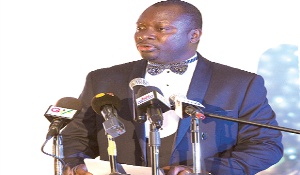Small and Medium scale Enterprises must be supported to succeed with the requisite business advice and tailor-made financial products, Chief Executive Officer of UMB, Mr. John Awuah, has said.
SMEs account for the majority of businesses in the country, but the sector is deemed highly risky by some financial institutions and is therefore not able to attract cheap funding.
Speaking as a panelist at the just-ended UK-Ghana Summit held in Accra, Mr. Awuah said the sector should not be neglected but supported to grow and create jobs for the hundreds of unemployed youth.
“We as financial facilitators have shown our firm commitment to the business community by dedicating three (3) of our branches – called the UMB Centre for Businesses – solely toward the advancement of small and medium-sized businesses,” he said.
He added that UMB has also resolved to financially back viable projects under government’s ‘One District, One Factory’ initiative.
“In furtherance of our commitment to be partners in government’s quest to fulfil its developmental agenda, we also have the UMB PPP Incubator Centre set up primarily to provide relevant support services to private businesses interested in working with government on various projects, including the flagship ‘One District, One Factory’ initiative,” he added.
The ‘One District, One Factory’ programme is designed to enable the country add value to its raw materials and reduce importation of major food items imported into the country. When successfully executed, the project is also expected to reduce the country’s balance of trade deficit.
The agricultural sector in 2017 accounted for about 18% of Ghana’s Gross Domestic Product (GDP); but, interestingly, in 2008 it contributed 31% to GDP – meaning there has been an annual average decline of about 5.7%.
That notwithstanding, the major export crop, cocoa, accounts for 20–25% of total foreign exchange earnings annually.
Agribusiness has a very high multiplier effect on employment, creating over 750 jobs for every additional US$1m of output and employing nearly half of the country’s workforce.
Two-thirds of the non-oil manufacturing sector depends on agriculture for raw materials. These figures clearly underpin the Agricultural sector’s significance to growth of the economy.
Ghana’s population of 28 million people spends about US$2bn annually importing more than two-thirds of their staples such as wheat and rice, according to the United Nation’s Food and Agriculture Organisation.
Also, a 2017 report from the U.S. Foreign Agriculture Service (FAS) estimated that domestic broiler meat production in Ghana would increase by 6% to 31,800 tonnes in 2017.
However, this was expected to meet less than 25% of demand, which grew from 161,000 tonnes in 2016 to 175,000 in 2017. This means imports – primarily from the US, Brazil and the EU – will likely rise by 12,700 tonnes to 143,000 tonnes in the medium-term.
Business News of Wednesday, 17 October 2018
Source: thebftonline.com

















